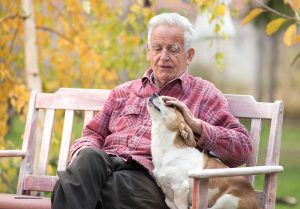Animal Chatter
By Iris Winston

Providing for your pets when you are no longer there to care for them
Almost every day for a year, I met an old man and his very old Basset hound when my dog and I were out for our morning walk. Then, when I didn’t see him for a few days, I checked with one of his neighbours and learned that he had been rushed to hospital and was unlikely to recover. The neighbour was caring for his dog and was willing to keep him if his owner did not return home.
That old hound was lucky to have his future assured. Too many pets — well cared for and dearly loved for most of their lives — end up homeless or sent to an animal shelter when their owners fall ill suddenly or die without having made provision for their animals’ lives without them.

Our pets trust us to love them, care for their needs and protect them as long as they live. They cannot ask for help when their owners disappear through sudden sickness or death. Therefore, it is up to us to make sure that our love for them is demonstrated in emergencies and beyond the grave.
Many of us have informal arrangements with relatives or close friends who have promised to care for our pets after our death. Much of the time, such an arrangement with animal lovers you trust
can be sufficient. But it is not always so. For instance, an acquaintance of mine asked his sister to look after his cats when he fell ill. Although she had little feeling for animals, she agreed and did feed and water them while he was in hospital. However, she had not expected his illness to be fatal and after his death, she took the cats to the nearest humane society. Her only concession to her brother’s memory was to ask that the cats should be adopted together. Sadly, I did not find out what she had done until it was too late to help the cats or even to find out whether they had been adopted together or even separately.
Unless we are absolutely sure that our wishes for our animals will be followed, it is surely better to take more organized responsibility for their future by including them in our estate plan, such as appointing an official pet guardian, making provision for them in our wills, having detailed letters accompanying any will explaining our wishes for animal care, or working through a pet trust that provides some financial support for their continuing welfare. (If you write your wishes early, it is wise to refer to the animals by type rather than name — dog, cat, bird, rabbit etc — in case you made your will before the present pets were part of your life.) It is also important to ensure that your requirements for animal care and welfare are
included in any Power of Attorney document.
As pets are considered property in Ontario and most other provinces and territories in Canada, they cannot be direct beneficiaries of a cash settlement. Instead, funds must be directed to a pet guardian or through a pet trust. Leaving some funds for pet care is particularly important if you have multiple pets or if an animal is aging or has a chronic condition. The heaviest expenses in caring for animals are generally in any pet’s senior years.
It is also important to plan for issues other than death, that would leave you incapable of looking after your pet. Suppose, for example, that you were overtaken by a disease that results in memory loss and you might forget to feed your pet, or you were severely injured in a vehicle collision. It is helpful to keep information in your wallet alerting paramedics that you had a pet at home that required care. Keeping an up-to-date list of your animals’ food and medical requirements, routines and veterinary contact information is also useful for any time you may need a temporary caregiver or for the person designated to take care of your pets permanently. Some pet owners worry that their dog (more often than other animals) is too attached to them to settle down with a different owner and direct that the animal should be euthanized when they die. While that owner is trying to prevent pain and suffering to the animal and making a decision based on love, it is extremely difficult for the heirs to comply if they are animal lovers too.
However, if the animal is old and sick and the executor believes, as the owner did, that the pet could not adjust to a new home at this stage in his life, it might be the most humane — though a very
sad route to take. Whatever the decision, the key is to provide a safe solution for your pets when you are no longer there for them. We owe it to the animals who have been loyal to us throughout their lives.






